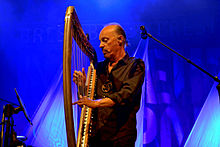Retro Revolution Records
Alan Stivell – E Langonned -1975 Folk Rock, Acoustic, Celtic, Folk (vinyl)
Alan Stivell – E Langonned -1975 Folk Rock, Acoustic, Celtic, Folk (vinyl)
Couldn't load pickup availability
Alan Stivell – E Langonned -1975 Folk Rock, Acoustic, Celtic, Folk (vinyl)
stock photo only
Sleeve Condition (Out of 10) ~ 8 slight waer
Label Condition (Out of 10) ~ 10
Vinyl Condition ~ (Out of 10)
Side 1 -10
side 2 - 10
BIN # *53
Early life and career beginnings

Alan Stivell was born in the Auvergnat town of Riom. His father Georges (Jord in Breton) Cochevelou was a civil servant in the French Ministry of Finance who achieved his dream of recreating a Celtic or Breton harp in the small town of Gourin, Brittany[2] and his mother Fanny-Julienne Dobroushkess was of Lithuanian-Jewish descent. In 1953, Alan began playing the instrument at the age of nine under the tutelage of his father and Denise Megevand, a concert harpist. Alan also learned Celtic mythology, art and history as well as the Breton language, traditional Breton dance and the Scottish bagpipe and the bombarde, a traditional Breton instrument, from the oboe family. Alan began playing concerts at eleven years and studying traditional Breton, English, Irish, Scottish, and Welsh folk music, also learning the drum, Irish flute, and tin whistle.[1] He competed in and won several Breton traditional music competitions in the Bleimor Pipe band.[3] Alan spent his childhood in Paris, with its cosmopolitan influences. But he fell in love with Breton music and Celtic culture in general, and often went back in his teens to Brittany.[1]
Alan's first recording came in 1960 ("Musique gaelique"), a single that was followed by the LP Telenn Geltiek in 1964. He already recorded solo harp and harp backing singers in 1959 with Breiz ma bro ("Brittany my country") and a Mouez Breiz EP ("Voice of Brittany") with the female singer Andrea Ar Gouilh. His stage name, "Stivell", means "fountain" or "spring" in Breton. This name refers both to the Breton renewal and to his surname "Cochevelou" (an evolution of kozh stivelloù, "the old fountains").[1]
Stivell and the Celtic harp revival
With a new bardic harp with bronze strings, Stivell began experimenting with modernized styles of music known as Celtic rock. In 1966, Alan Stivell began to perform and record as a singer. The following year, he was signed by Philips (Universal). This was during the birth of the New Breton and Celtic music movement. In 1968, after two years of touring and regular appearances at the American Students and Artists Center in Paris, Alan joined the Moody Blues onstage to perform in London's Queen Elizabeth Hall.[4]
In 1970, Stivell released his first hits, the single "Broceliande" and the album "Reflets", both on the Philips record label. He became closely associated with the burgeoning Breton roots revival, especially after the release of the purely instrumental 1971 album Renaissance of the Celtic Harp, which won one of the most famous awards in France, the prize of the Académie Charles Cros.[3]
The music critic Bruce Elder wrote of the album Renaissance of the Celtic Harp:
People who hear this record are never the same again. Renaissance of the Celtic Harp, one of the most beautiful and haunting records ever made by anybody, introduced the Celtic harp to many thousands of listeners around the world. To call this music gorgeous and ravishing would be the height of understatement—indeed, there aren't words in the English language to describe this record adequately. The opening work, 'Ys', is a piece inspired by the legend of the fifth century capital of the kingdom of Cornwall, (most versions of the legend place the city in the Douarnenez Bay on the coast of Brittany), [said to have been] engulfed by a flood as punishment for its sins. (Debussy wrote one of his finest works, "The Engulfed Cathedral," later adapted by the group Renaissance into "At the Harbour" on the 1973 album Ashes Are Burning, based on the same legend). The reflective "Marv Pontkellec" is every bit as sublimely beautiful, but the highlight of this record is "Gaeltacht," a 19-minute musical journey by Stivell's harp across the Gaelic lands of Ireland, Scotland, and the Isle of Man.[5][6]
On 28 February 1972 Stivell performed a concert in the Olympia theater, the most famous music hall in Paris, where Alan and his band played music combining traditional Celtic music with modern sounds (electric guitar, drums, etc.). This concert made Stivell and his music well known throughout France.[2] At this time, Stivell's eclectic approach to music was very new and was considered risky, but it soon became popular. Over 1,500,000 records of that concert ("A l'Olympia") were sold. Alan Stivell's new found fame propelled him to tour across France, the United Kingdom, Canada and the United States. He continued recording, and published a collection of Breton poetry in 1976.[2] With his 1980 Symphonie Celtique, he mixed for the first time elements of rock, a symphonic orchestra, Celtic instruments and such non-European ethnic elements as Berber vocalist Djourha and sitarist Narendra Bataju.[3]
The folk music revival faded somewhat in the 1980s. Though Alan Stivell still maintained a popular following, he did not reach the heights of popularity that he had in the 1970s. He continued touring in many parts of the world and recording for a loyal fanbase. He also worked with the English singer Kate Bush.
| Alan Stivell | |
|---|---|

|
|
| Background information | |
| Birth name | Alan Cochevelou |
| Born |
6 January 1944 (age 72) Riom, Auvergne, France |
| Genres | Celtic music |
| Occupation(s) | Singer-songwriter-composer-musician |
| Years active | 1960-present |
| Labels | Keltia III |
| Website | alanstivell |
Tracklist
| A1 | E Parrez Langonned | 3:38 |
| A2 | Gavotten Pourled | 1:50 |
| A3 | Planedenn | 2:58 |
| A4 | Ne Bado Ket Atao | 1:49 |
| A5 | Bwthyn Fy Nain | 1:28 |
| A6 | Ffarwel I Aberystwyth | 2:10 |
| A7a | Briste Leathair Pheadair | 1:54 |
| A7b | Mairseal A' Chearc | |
| - | ||
| A8a | Dans Fisel | 2:25 |
| A8b | Gavotten Ar Menez | |
| A8c | An Sagart Cheolnhar | |
| - | ||
| B1 | Bal Fisel | 1:13 |
| B2 | Deus Ganin Me D'Am Bro | 2:45 |
| B3 | Jenovefa | 2:52 |
| B4 | Sagart O Donaill | 1:31 |
| B5 | Diougan Gwenc'hlan | 2:37 |
| B6 | Ar Voraerion | 2:26 |
| B7 | Faili Faili Oro | 2:17 |
| B8 | Oye Vie | 1:38 |
Share


